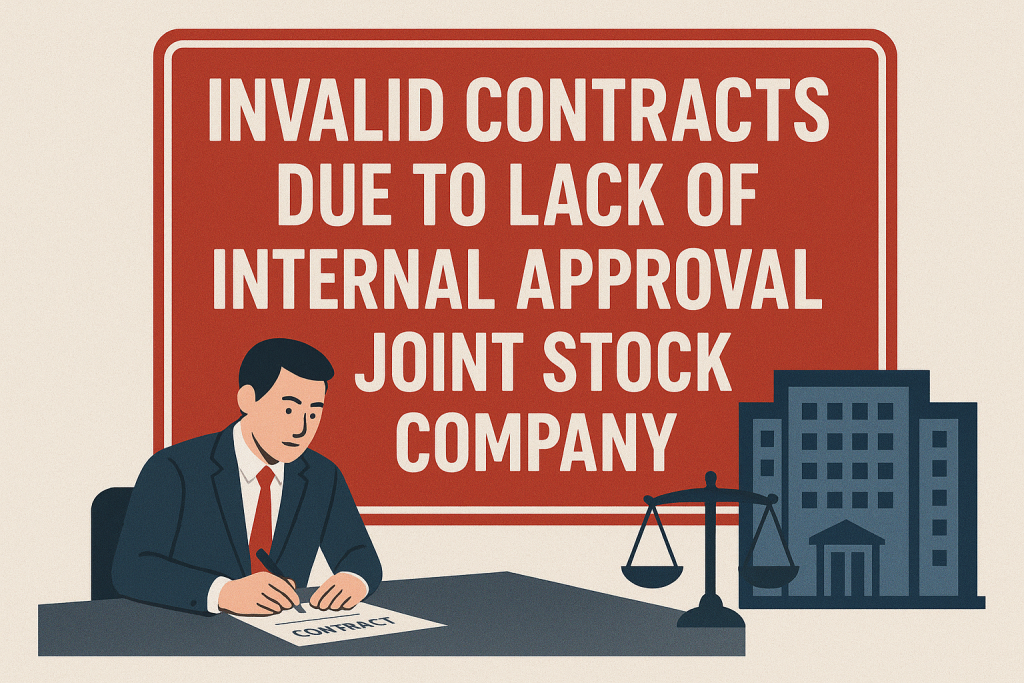
In the realm of corporate governance, the validity of contracts is paramount to ensuring the smooth operation and integrity of joint stock companies. A significant issue arises when contracts are executed without the necessary internal approvals mandated by corporate bylaws or statutory regulations. Such invalid contracts can lead to disputes, financial losses, and reputational damage for the company. This paper examines the implications of contracts deemed invalid due to a lack of internal approval in joint stock companies, exploring the legal frameworks that govern these situations, the potential consequences for the parties involved, and the importance of adhering to governance protocols to mitigate risks.
- Which contracts and transactions are subject to mandatory internal approval procedures?
Pursuant to Clause 1, Article 167 of the Law on Enterprises 2020, the requirement for internal approval procedures applies to contracts and transactions between the company and its related parties, including: (i) Shareholders or authorized representatives of organizational shareholders holding more than 10% of the total common shares, and their related persons; (ii) Members of the Board of Directors (BOD), the Director or General Director, and their related persons; (iii) Enterprises in which members of the BOD, Supervisory Board, the Director or General Director, and other managers of the company are required to declare their interests.
In the event that such procedures are not duly and properly complied with, the relevant contract or transaction may be declared null and void by a court decision. In such case, the parties are obliged to restore the original status and return to each other what they have received.
It should be noted that joint liability is imposed on the contracting party, the shareholder, members of the BOD, the Director or General Director who entered into such contract or transaction. They must compensate for any damage arising therefrom and reimburse the company for any benefits gained from the transaction that failed to comply with the prescribed approval procedure.
- Authority and procedures for internal approval of contracts and transactions in a joint stock company?
Pursuant to the company’s Charter in conformity with the Law on Enterprises, the authority to approve contracts and transactions between the company and its related parties rests either with the General Meeting of Shareholders (GMS) or the BOD, depending on each specific case.
- Cases under the authority of the Board of Directors
The BOD shall approve contracts and transactions with related parties if such transactions have a value of less than 35% of the company’s total assets as recorded in the most recent financial statement, or another lower threshold if specifically provided in the company’s Charter.
The company’s representative signing the contract is responsible for carrying out the notification procedure. In addition to BOD members, the notification must also be delivered to the Supervisors.
The notification must include: (i) the draft contract or the principal contents of the transaction; (ii) the related party(ies) to the contract or transaction.
- Cases under the authority of the General Meeting of Shareholders
The GMS shall approve: Transactions that exceed the decision-making authority of the BOD; contracts or transactions involving loans, borrowings, or sales of assets with a value greater than 10% of the company’s total assets as recorded in the most recent financial statement, if entered into between the company and a shareholder holding 51% or more of the total voting shares or such shareholder’s related persons.
The company’s representative signing the contract must likewise carry out the notification procedure. The notification must be sent to BOD members and simultaneously to the Supervisors. The BOD shall then present the notified contents at the nearest GMS meeting or carry out the necessary procedure to obtain the GMS’s approval in writing.
The notification must include: (i) the draft contract or the principal contents of the transaction; (ii) the related party(ies) to the contract or transaction.
- Notes on disclosure obligations?
For the company, upon completion of the internal approval procedures, contracts and transactions must be disclosed by the company in accordance with the law. The company also bears the responsibility to compile, update, and regularly notify the list of its related persons.
For members of the BOD, Supervisors, the Director or General Director, and other managers of the company, they are required to comply with the statutory obligation to declare to the company their related interests, including information on enterprises in which they hold shares or capital contributions, so as to provide a legal basis for evaluating and monitoring related-party transactions.
In conclusion, the prevalence of invalid contracts resulting from insufficient internal approval poses a considerable challenge for joint stock companies. The legal ramifications of such contracts not only jeopardize the enforceability of agreements but also expose companies to financial liabilities and operational disruptions. To safeguard against these risks, it is essential for companies to establish robust internal approval processes and ensure adherence to governance standards. By doing so, joint stock companies can promote accountability, enhance their legal standing, and ultimately foster a culture of compliance that supports sustainable business practices.
📞 CONTACT LEGAL CONSULTANT:
TLA Law is a leading law firm with a team of highly experienced lawyers specializing in criminal, civil, corporate, marriage and family law, and more. We are committed to providing comprehensive legal support and answering all your legal questions. If you have any further questions, please do not hesitate to contact us.
1. Lawyer Vu Thi Phuong Thanh, Manager of TLA Law LLC, Ha Noi Bar Association
Email: vtpthanh@tlalaw.vn
2. Lawyer Tran My Le, Chairman of the Members’ Council, Ha Noi Bar Association
Email: tmle@tlalaw.vn.
Dinh Phuong Thao

